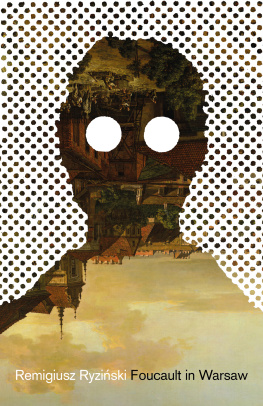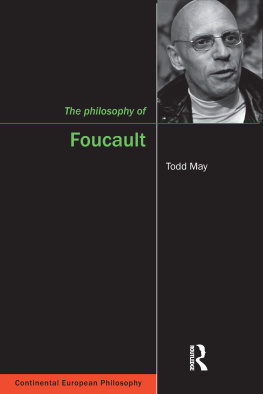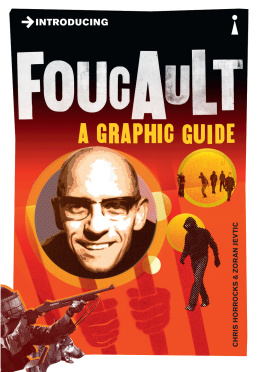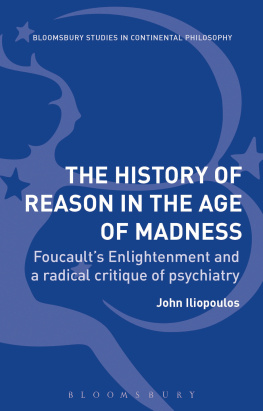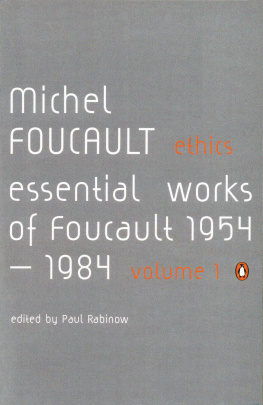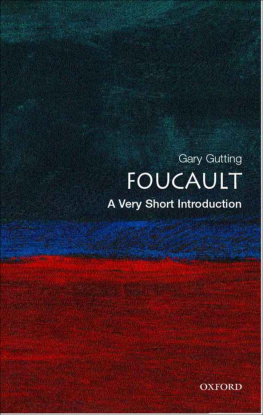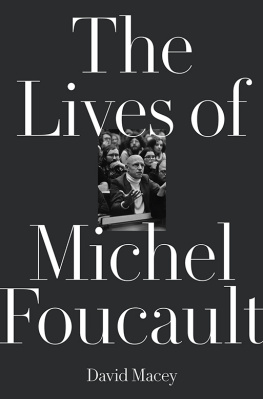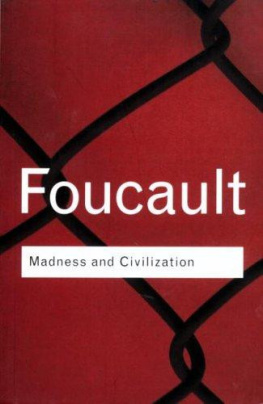Contents
Page List
Guide
FOUCAULT IN WARSAW
Copyright 2017 by Remigiusz Ryziski
Translation copyright 2021 by Sean Gasper Bye
First edition, 2021
All rights reserved
Library of Congress Cataloging-in-Publication Data: Available.
ISBN-13: 978-1-948830-36-2 | ISBN-10: 1-948830-36-1
This project is supported in part the New York State Council on the Arts with the support of Governor Andrew M. Cuomo and the New York State Legislature.
This publication has been supported by the POLAND Translation Program.
Printed on acid-free paper in the United States of America.
Cover Design by Daniel Benneworth-Gray
Interior Design by Anthony Blake
Open Letter is the University of Rochesters nonprofit, literary translation press: Dewey Hall 1-219, Box 278968, Rochester, NY 14627
www.openletterbooks.org
FOUCAULT IN WARSAW
REMIGIUSZ RYZISKI
Translated from the Polish by Sean Gasper Bye
In the stubborn, bright sun of Polish liberty.
History of Madness
CONTENTS
THE HERO OF THIS BOOK IS MICHEL FOUCAULT.
But not only him. Its Warsaw, too.
And also the boys whose company Foucault enjoyed most.
The linguistic gender mixinggirls, sisters, hercomes from the subcultural slang that these men often use to address one another, and to speak about themselves.
Husband refers to a homosexual partner. And straight means a heterosexual man, whom at times one might desire.
URBAN LEGEND
Michel Foucault came to Poland in October 1958.
He took a position as the first director of the newly-founded Center for French Culture at the University of Warsaw.
It was in Warsaw that he finished his doctoral thesis, later published as History of Madness.
Yet in mid-1959, he was forced to leave Poland.
The reason was a certain boy.
Jurek.
No one ever figured out who this boy really was.
IN SEARCH OF MICHEL FOUCAULT
The Institute of National Remembrance was the first place I turned to when seeking traces of Michel Foucault in Poland.
I was not the first to look at the Institute (commonly known by its Polish acronym IPN). Others had made repeated attempts to locate information about Foucault. It went without saying that the first director of the Center for French Culture in communist-era Warsaw would have been under surveillance.
There were definitely files on him.
The IPN: In response to your Application for access to documents for the purpose of conducting academic research, submitted as per art. 36, sec. 1, pt. 2 of the Institute of National Remembrance/Commission for the Prosecution of Crimes Against the Polish Nation Act of December 18, 1998 (Journal of Laws 2007, No. 63, item 424 [amended]), we hereby inform you that a preliminary survey of materials regarding Michel Foucault, b. 10/15/1926, conducted for the query titled: Michel Foucault in Warsaw (19581959), has returned no results. The Divisional Office for the Access and Archiving of IPN Documents in Warsaw has concluded its execution of this application.
I realized the lack of information at the IPN didnt mean that there was none, but rather it hadnt been discovered yet. So I wrote out the appropriate applications and started searching for Michel Foucault on my own.
Everywhere I turned, I got the same result.
The University of Warsaws documentation has no information about Michel Foucaults time at the philosophy department from 1958 to 1959.
Nor did I have any luck with my searches at the Jagiellonian University in Krakw or the University of Gdask, where, according to biographical information, Foucault guest-lectured. There was nothing at the Polish Academy of Sciences. A survey of files in the University of Warsaws philosophy department and the Institute of Romance Languages from later years also turned up nothing.
At the Center for French Culture, Foucaults archives were unavailable. The Institut Franais in Warsaw and Krakw knew nothing, except that Foucault had, in fact, been in Poland. The French Embassy sent general information about FrenchPolish cooperation from that period, but there was no mention at all of Foucault.
There are no archives from Orbis, the government travel agency that might have had information about the Hotel Bristol where Foucaults biographical records say he lived for some time. In the Okcie Airport archives, there is no data on Foucaults possible flights. Museums, cultural institutions, the Polish Press Agency, the magazines ycie Warszawy and Przekrj, and the Palace of Culture and Science have no information. Nor are there any records at the Auschwitz-Birkenau State Museum or at the famous psychiatric hospital in Tworki. The archives of the Capital City of Warsaw and the Museum of Literature contain no trace of the name Foucault.
There seemed to be no witnesses to his time here.
No memoirs, letters, documents, not a single photograph.
Michel Foucaults time in Poland seemed to be the stuff of legends.
THE RIGHT CATALOGUE NUMBER
I searched for information about Michel Foucault for over a year.
I went back to the Institute of National Remembrance many times.
Hundreds of musty-smelling files.
Papers, notes, photos, reports, denunciations, classified information, instructions and orders, conversation transcripts, and secret collaborators observations.
Keywords: necrophilia, pathology, fetish.
Dirty hands.
Dust.
Stickiness.
Obsession.
I looked through the archives from every possible angle. I pored through catalogues, exhausting the search engines with different combinations of queries and synonyms. No one knew what the key was. So I typed in:
Michel Foucault
just Foucault
just Michel
Paul Foucault (which was his real name).
Nothing.
I started looking for information in the files of people I suspected knew Foucault.
I searched people connected with France, embassy employees, people from the cultural world, artists.
I looked through the archives of prominent novelists, poets, and critics from that era: Jerzy Andrzejewski, Jarosaw Iwaszkiewicz, Tadeusz Kotarbiski, Miron Biaoszewski, Zygmunt Mycielski, Pawe Hertz, Jerzy Waldorff, Edward Stachura, Marek Hasko, and Ireneusz Iredyski. I learned many interesting things about this period and these people, where they spent their time, what they ate, whom they socialized with, what kinds of cars they drove, what tea they bought, whether they drank coffee, how late they came home and with whom. From wiretap records, I learned about their fears and desires.
But I still couldnt get my hands on any information about Foucault himself.
Finally I typed into the search engine of one of the computers in the Institutes reading room the most obvious word in the context of Michel Foucaults time in Warsaw.
I got one hit.
I filled out a request form.
After a two-week wait, the clerk handling my case called and said:
Mr. Ryzinski, you found the right catalogue number.

